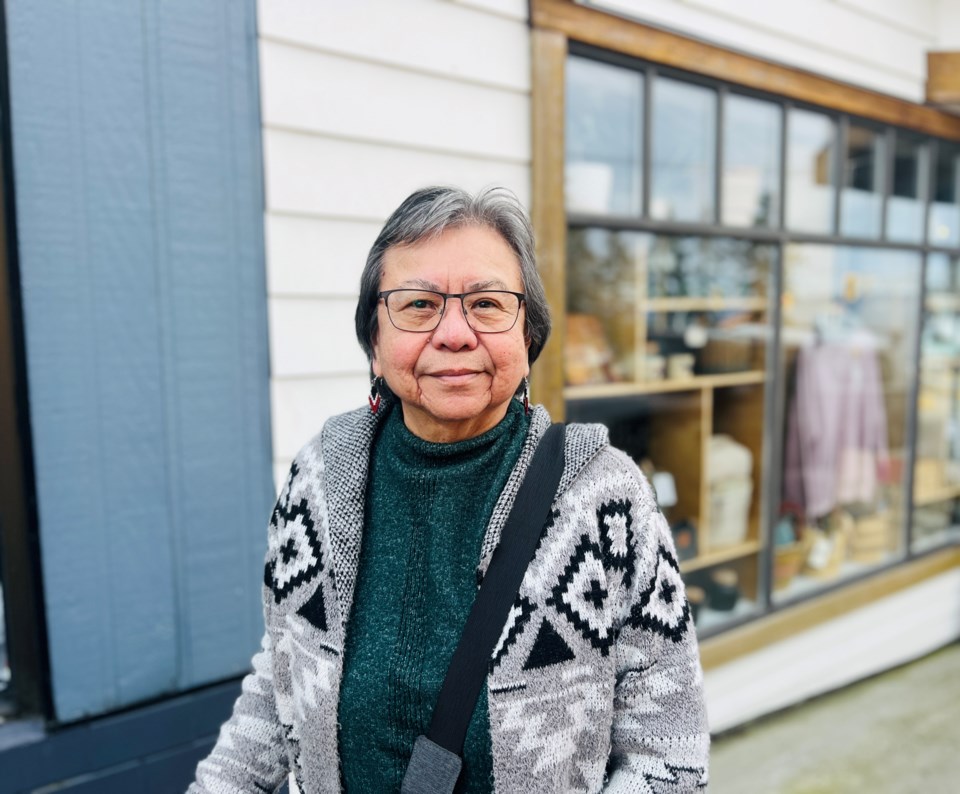Tla'amin elder and retired teacher Betty Wilson is known for many accomplishments, including saving ʔayʔaǰuθəm (ayajuthem) language from extinction, being a steadfast champion of education and Tla'amin traditional culture, and being honoured by Pope Francis just last year.
Now, Wilson is an author of a bilingual (ayajuthem/English) picture-book titled ɬagət hiyt t̓oxʷʊm/Herring to Huckleberries, which follows Wilson and her grandparents along traditional Tla'amin food harvesting routes to fish for herring and salmon, gather seasonal berries, hunt deer and dig up mollusks.
Whimsically illustrated by prolific artist Prashant Miranda, the hard-copy book will be available to readers of all ages in mid-April, with plans for a digital-audio version narrated in ayajuthem and English by Wilson.
Wilson said the book has many layers, including an introduction to the language to new readers, as well as being a resource for Indigenous students and teachers.
"It teaches, environmentally, how we lived off the land that was not contaminated at the time; we harvested mussels, oysters and clams in clean water, and we lived seasonally," said Wilson. "Now, you can't do that [harvest shellfish in t̓išosəm] because of contamination."
Wilson said her grandparents had a huge impact on her, not only because they taught her how to live seasonally off the land, but also their worldview, which had an emphasis on the importance of education, and maintaining good mental and physical well-being.
Wilson said she remembers her favourite foods growing up: smoked salmon, thimbleberry, butter clams and sea urchins, and [in the book] revisits the traditional food gathering and preparation techniques of Tla'amin Nation.
"Caring about our environment is actually for our future generations," said Wilson, “to be able to clean our waters and clean our land for them.”
Wilson said the book is more about her joy growing up with her family, living a good life, as healthy as they could, and not necessarily segregated to cultural teachings.
"I credit my good health to having eaten foods from the land," said Wilson. "My granny was a strong believer in taking care of one's health emotionally, mentally and spiritually."
Wilson still radiates the joy she felt growing up surrounded by family, stories and outdoor campouts and canoeing. She recounts in the book the mouthwatering tastes and smells of the foods she and her family prepared, which, unfortunately, most people will never get to experience.
"I found some wild strawberry plants [recently] and they're so good, but so tiny," said Wilson. "But, if you go into the more isolated areas, the wild strawberries are big."
Wilson said Tla'amin people had many words for the different types of blueberries they would pick, and when it was berry season, the children received their rush of vitamins.
"I decided [a few years ago] that I was going to become a traditional weaver," said Wilson. "I was looking at some of the baskets my great-grandparents had made but it's harder to find the traditional materials [plants] they used."
Wilson said her experience growing up, in a way, was at a unique point in history. It was a time of change, living a traditional land-based life, while at the same time experiencing electricity for the first time and going to school and learning how to read English.
"[At the time] we were constantly smoking and drying out fish, herring eggs and preserving foods," said Wilson. "White people weren't allowed onto the reserve after dark and native people weren't allowed into certain places in town."
Elder Elsie Paul grew up in a world even more deeply rooted in Tla'amin tradition and culture, but also survived being sent away to residential school in Sechelt, according to Paul's book, As I Remember It: Teachings from the Life of a Sliammon Elder.
"I grew up in that really transitional phase of electricity and the ability to buy refrigerators," said Wilson. "In the past, older elders than me, like Elsie, would have travelled with their grandparents hunting and harvesting off the land."
Indigenous and Tla'amin children were taken from their homes and sent to residential schools, with survivors and their families dealing with intergenerational trauma, broken relationships and loss of language. Now, Wilson said the younger Tla'amin generation is eager to know their language and their history.
"There is a resurgence to learn the history of our events because the young people are saying ‘we've missed out,’" said Wilson. "So it's really our young parents who started the language program in the schools, and we were really fortunate to have superintendents and principals who were forward-thinking and said, ‘yes, you can teach the language within the school system.’"
ɬagət hiyt t̓oxʷʊm/Herring to Huckleberries will be available April 15.
Join the Peak’s email list for the top headlines right in your inbox Monday to Friday.




